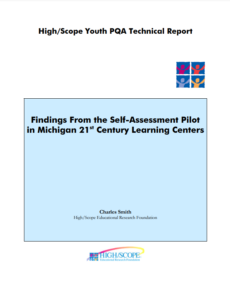Summary
Overall 24 sites within 17 grantees participated in the self-assessment pilot study by assembling staff teams to collect data and score the Youth Program Quality Assessment (PQA).
At each site an average of 5 staff spent an average of 13 staff hours to complete the self-assessment process.
Whether using an absolute standard or group norms as a benchmark for interpretation of data from the Youth PQA Self-Assessment Pilot Study (hereafter called the Pilot Study), quality scores were very positive for participating programs and also reflected the tendency of self-assessment scores to be biased toward higher quality levels.
The quality scores followed the same pattern as outside observer scores in other samples, highest on for issues of safety and staff support and lowest on higher order practices focused on interaction and engagement.
Youth PQA data collected using the self-assessment method demonstrated promising patterns of both internal consistency and concurrent validity with aligned youth survey responses.
Two thirds or more of sites reported that the observation and scoring process helped the selfassessment team to have greater insight into the operation of their programs, talk in greater depth about the program quality than usual, and have more concrete understanding of program quality.
Site directors and local evaluators said that the self-assessment process was a source of good conversations about program priorities and how to meet them. In almost all cases, concrete action followed from the self-assessment process.
Site directors and local evaluators demonstrated the ability to improvise the self-assessment method to fit local needs.
Program directors, site coordinators, and local evaluators have used the Youth PQA and statewide Youth PQA data to generate statewide program change models, suggesting that the instrument and data are useful for setting system-level improvement priorities.
Smith, C. (2005b). Findings from the self-assessment pilot in Michigan 21st Century Learning Centers. Ypsilanti, MI: High/Scope Educational Research Foundation.
